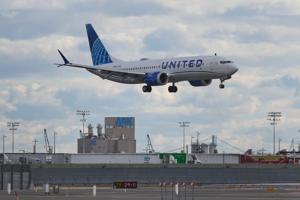World
Airlines Cut 1,000 Flights as U.S. Government Shutdown Affects Travel

Travelers across the United States faced significant disruptions on March 15, 2024, as airlines canceled over 1,000 flights due to a government shutdown that has strained air traffic operations. While airlines managed to keep most flights on schedule, the situation is expected to worsen in the coming days as the Federal Aviation Administration (FAA) has mandated a reduction in service at the nation’s busiest airports.
The FAA’s order, which aims to alleviate pressure on air traffic controllers working without pay, has already led to substantial flight cancellations. Although Friday’s cancellations represented a small fraction of overall flights, passengers at major hubs such as Atlanta, Dallas, Denver, and Charlotte faced long security lines and last-minute changes.
Passengers reported chaotic scenes at various airports. At Houston’s George Bush Intercontinental Airport, travelers described security lines that barely moved, with some resorting to lying down while waiting. “I’ve never seen anything like that,” said traveler Cara Bergeron, who flew from Houston to Atlanta.
Others faced even greater hurdles. Surgeon Karen Soika from Greenwich, Connecticut, found her flight from Newark Liberty International Airport was rescheduled for an earlier departure, only to discover it was actually departing from John F. Kennedy International Airport, over an hour away. Soika ultimately decided to rent a U-Haul truck to reach her destination in Utah, where she is consulting on a project related to the popular television series “Yellowstone.”
Flight Cancellations and Airline Response
Flight tracking service FlightAware reported that Friday’s cancellations were four times higher than those on Thursday, with significant disruptions observed in Chicago, Atlanta, Denver, and Dallas. The cancellations were exacerbated by increasing absenteeism among air traffic controllers, who have been working extended hours without compensation.
Both United Airlines and American Airlines reported they were able to rebook most affected passengers quickly. United spokesperson Josh Freed indicated that more than half of the rebooked passengers would reach their destinations within four hours of their original schedules. Airlines focused on cutting smaller regional routes, which minimized the impact on travelers. For example, American reduced its flights from Dallas to northwest Arkansas from 10 to 8 per day. Delta Air Lines canceled approximately 170 flights, while American planned to cut 220 flights daily through Monday. Southwest Airlines also canceled about 120 flights on Friday.
The situation prompted a surge in demand for one-way car rentals, with companies like Hertz reporting increased inquiries. The FAA announced that the reduction in flights at major airports would begin at 4% and ramp up to 10% a week from the order date.
Economic Implications and Future Outlook
The ongoing government shutdown raises broader concerns about the impact on air travel and logistics. Nearly half of all air freight in the U.S. is transported in passenger aircraft, which could lead to increased shipping costs, according to Patrick Penfield, a professor of supply chain practice at Syracuse University. “Air travel is part of the infrastructure backbone of the American economy,” said Greg Raiff, CEO of Elevate Aviation Group. “This shutdown is going to impact everything from cargo aircraft to people getting to business meetings to tourists being able to travel.”
Transportation Secretary Sean Duffy addressed the media, emphasizing the need for immediate action to alleviate disruptions. “I don’t want to see the disruption. I don’t want to see the delays,” he stated, underscoring the urgency of resolving the ongoing crisis.
Airlines are navigating uncharted territory as they respond to the evolving situation. According to Kerry Tan, a professor at Loyola University Maryland, the uncertainty stemming from the government shutdown complicates airlines’ ability to effectively plan their operations.
Travelers are advised to remain vigilant and proactive, with many considering alternative options in case of further cancellations. Christina Schlegel, a travel advisor from Arlington, Virginia, recommended that passengers research alternative flights and remain flexible with their travel plans.
As the government shutdown persists, the travel industry and its customers are left grappling with the uncertainty of future travel plans, highlighting the broader implications of political decisions on everyday lives.
-

 World3 weeks ago
World3 weeks agoGlobal Air Forces Ranked by Annual Defense Budgets in 2025
-

 World3 weeks ago
World3 weeks agoMass Production of F-35 Fighter Jet Drives Down Costs
-

 Science3 weeks ago
Science3 weeks agoTime Crystals Revolutionize Quantum Computing Potential
-

 World3 weeks ago
World3 weeks agoElectrification Challenges Demand Advanced Multiphysics Modeling
-

 Top Stories3 weeks ago
Top Stories3 weeks agoDirecTV to Launch AI-Driven Ads with User Likenesses in 2026
-

 Top Stories3 weeks ago
Top Stories3 weeks agoNew ‘Star Trek: Voyager’ Game Demo Released, Players Test Limits
-

 Lifestyle3 weeks ago
Lifestyle3 weeks agoDiscover Reese Witherspoon’s Chic Dining Room Style for Under $25
-

 Entertainment3 weeks ago
Entertainment3 weeks agoFreeport Art Gallery Transforms Waste into Creative Masterpieces
-

 Business3 weeks ago
Business3 weeks agoGold Investment Surge: Top Mutual Funds and ETF Alternatives
-

 Health3 weeks ago
Health3 weeks agoGavin Newsom Critiques Trump’s Health and National Guard Plans
-

 Politics1 week ago
Politics1 week agoLanguage Evolution: New Words Spark Confusion in Communication
-

 Lifestyle3 weeks ago
Lifestyle3 weeks agoLia Thomas Honored with ‘Voice of Inspiration’ Award at Dodgers Event









